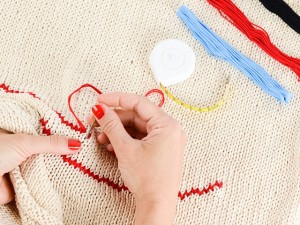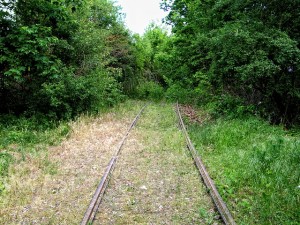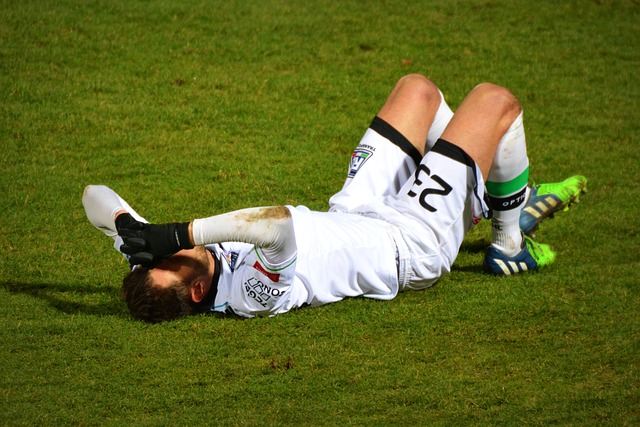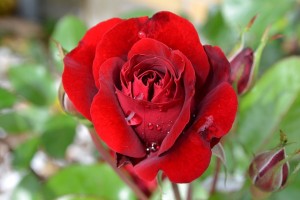to embroider, elaborate, embellish
[verb]
[voort-bor-du-ren, bor-duur-de voort, voort-ge-bor-duurd] ![]()
 The verb ‘voortborduren’ is derived from ‘borduren’: to embroider. So what’s the difference? The adverb ‘voort’ means ‘forward’ (or ‘on’) in Dutch and indicates continuation. So we continue embroidering? Yes, but only figuratively in the meaning of elaborating on an existing plan, theme or trend. It often implies that one continues elaboration along the same path and expands, so it is not about adding detail. So what if you really want to continue embroidering? Then you would say ‘voortgaan met borduren’, although ‘verder gaan’ would be more common.
The verb ‘voortborduren’ is derived from ‘borduren’: to embroider. So what’s the difference? The adverb ‘voort’ means ‘forward’ (or ‘on’) in Dutch and indicates continuation. So we continue embroidering? Yes, but only figuratively in the meaning of elaborating on an existing plan, theme or trend. It often implies that one continues elaboration along the same path and expands, so it is not about adding detail. So what if you really want to continue embroidering? Then you would say ‘voortgaan met borduren’, although ‘verder gaan’ would be more common.
Examples:
– “Mandie, heb je een heel nieuw liedje geschreven?” – “Niet echt, ik heb voortgeborduurd op het vorige thema, maar deze versie is uiteindelijk wel de beste denk ik.”
(“Mandie, did you write a completely new song?” – “Not really, I embroidered on the previous theme, but in the end I think this (new) version is the best one.” Note that ‘liedje’ is commonly used for popular songs accompanied by an instrument. A ‘lied’ is usually only sung.)
– “Heb je de nieuwste film van Tarantino gezien? Ik nog niet. Borduurt hij voort op zijn vorige films, of is het nu iets totaal anders?”
(“Have you seen Tarantino’s latest movie? I haven’t yet. Is it similar to his previous movies, or is it something completely different this time?” Note that in Dutch it is also common to say ‘nieuwste’ (‘newest’) when you mean ‘latest’.)
– “Ik wil dat jullie niet voortborduren op het voorbeeld uit het boek, maar met iets origineels komen. Succes!”
(“I do not want you to embroider on the example from the text book, but instead I want you to come up with something original. Good luck!”)
– “Zal de nieuwe paus voortborduren op het werk van zijn voorganger of een totaal andere weg inslaan?”
(“Will the new pope continue along the same lines as his predecessor or will he choose a completely different direction?” Lit. ‘turn onto a totally different road’.)
Related words:
– Voortgaan: to continue, to go on/ahead [verb] [ging voort, voortgegaan].
– Verder gaan: to continue, to go on/ahead [verb] [ging verder, verder gegaan].
– Uitweiden: to elaborate [verb] [weidde uit, uitgeweid]. ‘Uitweiden’ can almost be like ‘digressing’. When you want to say ‘can you elaborate a bit on that’, it’s also common to just say ‘kunt u daar iets meer over zeggen’ or ‘kunt u daarover meer details geven’.
– Borduren: to embroider [verb] [borduurde, geborduurd].
Things to remember from this DWOTD
– The difference between ‘borduren’ and ‘voortborduren’;
– The difference between a ‘liedje’ and a ‘lied’;
– The meaning of the adjective ‘nieuwste’ in ‘nieuwste film’;
– ‘Good luck!’ in Dutch is not ‘goede geluk!’ but ‘succes!’;
– The meaning of ‘een andere weg inslaan’.

 Last Saturday I ended up in an Amsterdam bar in the Jordaan called ‘
Last Saturday I ended up in an Amsterdam bar in the Jordaan called ‘ There are three words for ‘end’ in Dutch: ‘eind’, ‘einde’ and ‘end’. Both ‘eind’ and ‘end’ can also be used in the meaning of ‘(a) distance’, see the Examples below.
There are three words for ‘end’ in Dutch: ‘eind’, ‘einde’ and ‘end’. Both ‘eind’ and ‘end’ can also be used in the meaning of ‘(a) distance’, see the Examples below. A ‘huilebalk’ is an annoying child that cries or whines at the drop of a hat. The word is also used to describe adults who are known to whine quickly, or otherwise easily get emotionally upset. When talking about a baby that cries most of the time (including the night), we use the word ‘huilbaby’.
A ‘huilebalk’ is an annoying child that cries or whines at the drop of a hat. The word is also used to describe adults who are known to whine quickly, or otherwise easily get emotionally upset. When talking about a baby that cries most of the time (including the night), we use the word ‘huilbaby’. The literal translation of ‘rooskleurig’ is ‘rose-coloured’. Perhaps because there is no unique colour for roses, one encounters ‘rooskleurig’ more often in the figurative meaning of ‘reflecting optimism’, e.g. ‘een rooskleurige toekomst’: a bright future.
The literal translation of ‘rooskleurig’ is ‘rose-coloured’. Perhaps because there is no unique colour for roses, one encounters ‘rooskleurig’ more often in the figurative meaning of ‘reflecting optimism’, e.g. ‘een rooskleurige toekomst’: a bright future.